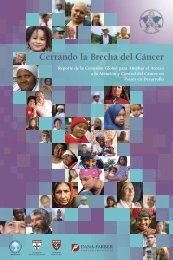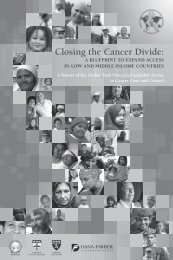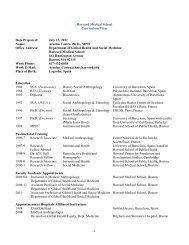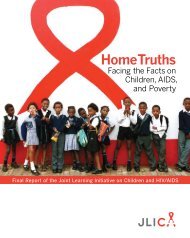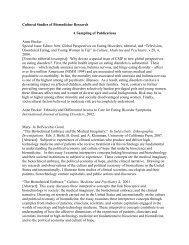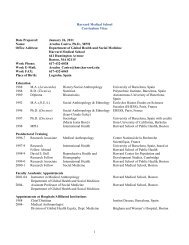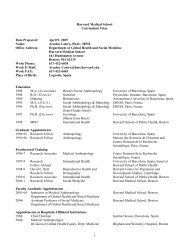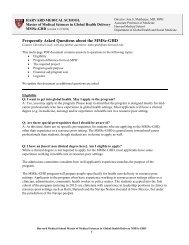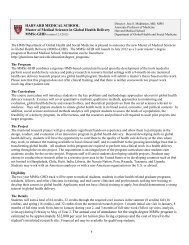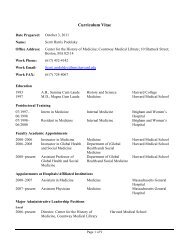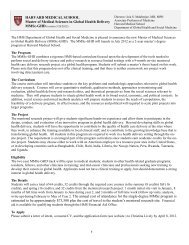Internships in Latin America and the Caribbean - The Department of ...
Internships in Latin America and the Caribbean - The Department of ...
Internships in Latin America and the Caribbean - The Department of ...
Create successful ePaper yourself
Turn your PDF publications into a flip-book with our unique Google optimized e-Paper software.
<strong>Internships</strong> <strong>in</strong> Lat<strong>in</strong> <strong>America</strong> <strong>and</strong> <strong>the</strong> <strong>Caribbean</strong><br />
~ Per<strong>in</strong>atal <strong>and</strong> Neonatal Cl<strong>in</strong>ical History Form Project (PANC) ~<br />
~ <strong>The</strong> Turnaround Time Project (TAT) ~<br />
Internship Overview<br />
In collaboration with <strong>the</strong> Global Infectious Diseases Program/Harvard University Center for AIDS<br />
Research at <strong>the</strong> Harvard Initiative for Global Health (HIGH), undergraduate students may apply to<br />
mentored global health research <strong>in</strong>ternships <strong>in</strong> Lat<strong>in</strong> <strong>America</strong> <strong>and</strong> <strong>the</strong> <strong>Caribbean</strong>.<br />
<strong>The</strong> Lat<strong>in</strong> <strong>America</strong>n <strong>and</strong> <strong>Caribbean</strong> Initiative for <strong>the</strong> Integration <strong>of</strong> Prenatal Care with <strong>the</strong> Test<strong>in</strong>g<br />
<strong>and</strong> Treatment <strong>of</strong> HIV <strong>and</strong> Syphilis (ILAP) has <strong>the</strong> goal to streng<strong>the</strong>n health systems through <strong>the</strong><br />
<strong>in</strong>tegration <strong>of</strong> prenatal care with <strong>the</strong> test<strong>in</strong>g <strong>and</strong> treatment <strong>of</strong> HIV <strong>and</strong> syphilis <strong>and</strong> <strong>the</strong><br />
development <strong>of</strong> health care delivery mechanisms that contribute to <strong>the</strong> universal access global<br />
strategy on HIV prevention, treatment, <strong>and</strong> care. <strong>The</strong> Initiative br<strong>in</strong>gs toge<strong>the</strong>r <strong>the</strong> expertise <strong>of</strong><br />
public health decision-makers, program managers, <strong>and</strong> practic<strong>in</strong>g cl<strong>in</strong>icians from multiple<br />
countries (Brazil, Colombia, Cuba, Dom<strong>in</strong>ican Republic, Nicaragua, Paraguay, Peru, <strong>and</strong><br />
Uruguay), <strong>and</strong> <strong>in</strong>ternational <strong>in</strong>stitutions (UNICEF, UNAIDS, <strong>and</strong> PAHO) with rigorous<br />
ethnographic <strong>and</strong> epidemiological research <strong>and</strong> health policy analysis coord<strong>in</strong>ated by Harvard<br />
Medical School.<br />
<strong>The</strong> shared aim is to develop a multi-country <strong>in</strong>tervention-oriented plan to universalize test<strong>in</strong>g<br />
<strong>and</strong> treatment for HIV <strong>and</strong> syphilis dur<strong>in</strong>g pregnancy <strong>and</strong> neonatal care—a topic that has thus far<br />
received <strong>in</strong>adequate attention <strong>in</strong> Lat<strong>in</strong> <strong>America</strong> <strong>and</strong> <strong>the</strong> <strong>Caribbean</strong> (LAC). Its implications for<br />
public health are enormous: <strong>the</strong> Initiative’s objectives are to contribute to <strong>the</strong> early diagnosis <strong>and</strong><br />
timely treatment <strong>of</strong> HIV <strong>and</strong> syphilis <strong>in</strong> women, decrease <strong>the</strong> numbers <strong>of</strong> mo<strong>the</strong>r-to-child<br />
transmissions <strong>of</strong> HIV, congenital syphilis, <strong>and</strong> o<strong>the</strong>r STIs, <strong>and</strong> provide better care for large<br />
numbers <strong>of</strong> women <strong>and</strong> children <strong>in</strong> LAC—while provid<strong>in</strong>g a framework for national <strong>and</strong><br />
<strong>in</strong>ternational large-scale policy change aimed at streng<strong>the</strong>n<strong>in</strong>g health systems. <strong>The</strong> Initiative is<br />
coord<strong>in</strong>ated from <strong>the</strong> <strong>Department</strong> <strong>of</strong> Global Health <strong>and</strong> Social Medic<strong>in</strong>e at Harvard Medical<br />
School, whose mission is to apply social science <strong>and</strong> humanities research to constantly improve <strong>the</strong><br />
practice <strong>of</strong> medic<strong>in</strong>e, <strong>the</strong> delivery <strong>of</strong> treatment, <strong>and</strong> <strong>the</strong> development <strong>of</strong> health care policies locally<br />
<strong>and</strong> worldwide.<br />
<strong>The</strong>se <strong>in</strong>ternships work with<strong>in</strong> two projects, PANC <strong>and</strong> TAT. Students may state a preference for<br />
one project over ano<strong>the</strong>r.<br />
<strong>The</strong> goal <strong>of</strong> <strong>the</strong> PANC project is to characterize <strong>the</strong> current use <strong>of</strong> <strong>the</strong> Lat<strong>in</strong> <strong>America</strong>n Center for<br />
Per<strong>in</strong>atology's (CLAP) Prenatal Cl<strong>in</strong>ical History (HCP)—<strong>the</strong> form most used <strong>in</strong> Lat<strong>in</strong> <strong>America</strong> to<br />
take a prenatal cl<strong>in</strong>ical history—<strong>in</strong> a participant country to facilitate its development as an<br />
<strong>in</strong>strument to record <strong>and</strong> report data about HIV <strong>and</strong> syphilis <strong>in</strong> prenatal <strong>and</strong> neonatal care <strong>and</strong> to<br />
improve cl<strong>in</strong>ical follow-up, epidemiologic monitor<strong>in</strong>g, <strong>and</strong> plann<strong>in</strong>g by <strong>the</strong> m<strong>in</strong>istries <strong>of</strong> health.<br />
<strong>The</strong> goal <strong>of</strong> <strong>the</strong> TAT project is to underst<strong>and</strong> <strong>the</strong> flow <strong>of</strong> syphilis <strong>and</strong> HIV tests performed dur<strong>in</strong>g<br />
pregnancy, measure laboratory turnaround time for both tests <strong>in</strong> various sett<strong>in</strong>gs with<strong>in</strong> an ILAP<br />
country, <strong>and</strong> identify <strong>the</strong> actions that should take place to shorten TAT. With<strong>in</strong> <strong>the</strong> context <strong>of</strong> this<br />
project, turnaround time is def<strong>in</strong>ed as <strong>the</strong> length <strong>of</strong> time from <strong>the</strong> po<strong>in</strong>t a test is prescribed to <strong>the</strong><br />
time <strong>the</strong> test result guides <strong>the</strong> health provider <strong>in</strong> mak<strong>in</strong>g a cl<strong>in</strong>ical decision.
In both projects, <strong>in</strong>terns would be mentored by Arachu Castro, PhD, Assistant Pr<strong>of</strong>essor <strong>of</strong> Social<br />
Medic<strong>in</strong>e <strong>in</strong> <strong>the</strong> <strong>Department</strong> <strong>of</strong> Global Health <strong>and</strong> Social Medic<strong>in</strong>e at Harvard Medical School,<br />
Senior Advisor for Mexico <strong>and</strong> Project Manager for Guatemala at Partners In Health, <strong>and</strong> Medical<br />
Anthropologist <strong>in</strong> <strong>the</strong> Division <strong>of</strong> Global Health Equity <strong>in</strong> <strong>the</strong> <strong>Department</strong> <strong>of</strong> Medic<strong>in</strong>e at Brigham<br />
<strong>and</strong> Women’s Hospital. Pr<strong>of</strong>essor Castro will mentor students dur<strong>in</strong>g <strong>the</strong> spr<strong>in</strong>g <strong>and</strong> summer <strong>and</strong><br />
assist <strong>in</strong> develop<strong>in</strong>g <strong>the</strong> <strong>in</strong>tern’s specific project dur<strong>in</strong>g <strong>the</strong> spr<strong>in</strong>g semester. Student <strong>in</strong>terns will<br />
additionally have an <strong>in</strong>-country mentor; depend<strong>in</strong>g on <strong>the</strong> <strong>in</strong>terest <strong>of</strong> <strong>the</strong> student <strong>and</strong> <strong>the</strong> needs <strong>of</strong><br />
<strong>the</strong> project, <strong>the</strong> mentor may be an academic, government <strong>of</strong>ficial, or United Nations staff member.<br />
<strong>Internships</strong> will be available <strong>in</strong> several Lat<strong>in</strong> <strong>America</strong>n countries; <strong>the</strong> f<strong>in</strong>al country list will be<br />
available <strong>in</strong> February.<br />
Program Application <strong>and</strong> Selection Process<br />
In order to qualify for this <strong>in</strong>ternship, students must have taken ei<strong>the</strong>r Anthropology 1825 or<br />
Societies <strong>of</strong> <strong>the</strong> World 25. A letter <strong>of</strong> support from one <strong>of</strong> <strong>the</strong> faculty <strong>in</strong>structor(s) is required.<br />
Sufficient written <strong>and</strong> oral language skills <strong>in</strong> Spanish, Portuguese, or French are required for most<br />
<strong>in</strong>ternships, to be demonstrated dur<strong>in</strong>g <strong>the</strong> <strong>in</strong>terview process.<br />
Applications are due February 12, 2010. Students will be required to complete <strong>the</strong> onl<strong>in</strong>e<br />
Common Application for Research <strong>and</strong> Travel (CARAT). Applicants must also apply for a David<br />
Rockefeller International Experience Grant. F<strong>in</strong>alists will be <strong>in</strong>vited to <strong>in</strong>terview at HIGH with <strong>the</strong><br />
<strong>in</strong>ternship faculty director, who will select <strong>the</strong> 2010 <strong>in</strong>terns.<br />
Program Dates <strong>and</strong> Award<br />
<strong>The</strong> ILAP Internship is an 8-10 week program, but students will be required to work with a faculty<br />
member dur<strong>in</strong>g <strong>the</strong> spr<strong>in</strong>g before departure. Specific hours are to be determ<strong>in</strong>ed, <strong>and</strong> specific<br />
dates for travel are pend<strong>in</strong>g.<br />
Interns will submit a budget for hous<strong>in</strong>g <strong>and</strong> o<strong>the</strong>r expenses (students must coord<strong>in</strong>ate hous<strong>in</strong>g on<br />
<strong>the</strong>ir own, with guidance from HIGH <strong>and</strong> o<strong>the</strong>r mentors) to ei<strong>the</strong>r OIP or HCRP (see above), <strong>and</strong><br />
HIGH will cover airfare <strong>and</strong> pre-departure medical costs.<br />
For questions about this opportunity, please contact:<br />
Application/Fund<strong>in</strong>g Inquiries: Research/Site Inquiries:<br />
Jonathan Colburn Brenda Rodriguez<br />
Project Coord<strong>in</strong>ator Program Manger<br />
Harvard Initiative for Global Health Harvard Initiative for Global Health<br />
Phone: 617-495-9213 Phone: 617-496-1192 / 617-432-6758<br />
Email: jonathan_colburn@harvard.edu Email: brenda_rodriguez@harvard.edu



